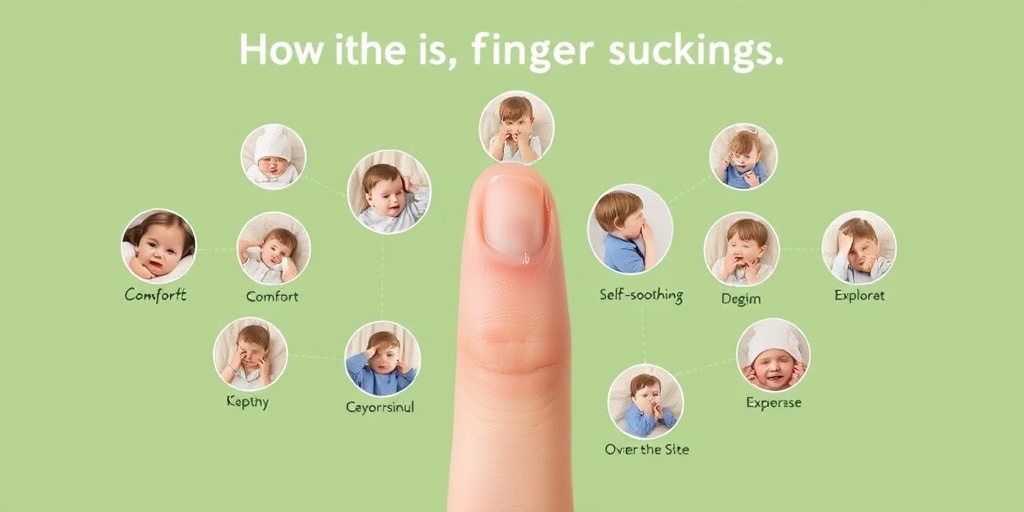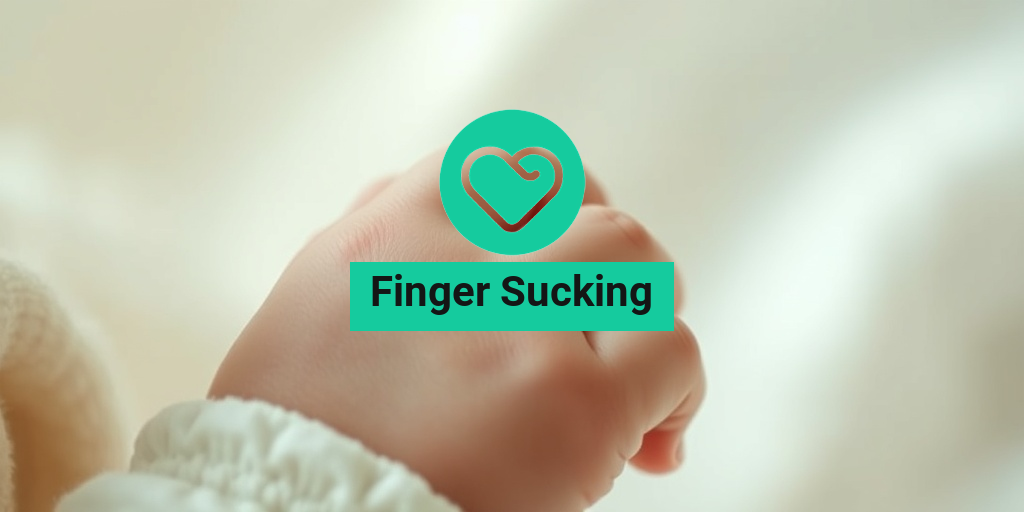What Is Finger Sucking?
Finger sucking is a common behavior observed in infants and young children, where they place their fingers, typically their thumbs or other digits, into their mouths. This action is often instinctual and serves various purposes, from self-soothing to exploration. While it may seem like a harmless habit, understanding the implications of finger sucking is essential for parents and caregivers.
The Psychology Behind Finger Sucking
Finger sucking is primarily a self-soothing mechanism. Infants often engage in this behavior to comfort themselves, especially during stressful situations or when they are tired. It mimics the act of breastfeeding, providing a sense of security and familiarity. As children grow, finger sucking can also serve as a way to cope with anxiety or boredom.
When Does Finger Sucking Become a Concern?
While finger sucking is generally considered a normal part of childhood development, it can become a concern if it persists beyond the age of 4 or 5. Prolonged finger sucking may lead to dental issues, such as misalignment of teeth or changes in the shape of the mouth. Additionally, it can affect social interactions as children grow older, potentially leading to teasing or embarrassment.
Finger Sucking in Infants
Finger sucking is particularly prevalent in infants, often starting as early as a few months old. Understanding this behavior in infants can help parents navigate its implications and manage it effectively.
Why Do Infants Suck Their Fingers?
Infants suck their fingers for several reasons:
- Comfort: Sucking provides a sense of security and comfort, especially during stressful moments.
- Exploration: Babies explore their world through their mouths, and finger sucking is a natural part of this exploration.
- Hunger: Sometimes, infants may suck their fingers when they are hungry, as a way to signal their need for food.
Is Finger Sucking Harmful for Infants?
In most cases, finger sucking is not harmful to infants. It is a natural behavior that helps them develop their sensory skills. However, parents should monitor the frequency and duration of the habit. If an infant is constantly sucking their fingers, it may be worth exploring underlying causes, such as stress or discomfort.
How to Manage Finger Sucking
If you are concerned about your infant’s finger sucking, here are some strategies to consider:
- Provide Alternatives: Offer a pacifier or teething toy to satisfy their need to suck.
- Encourage Other Comforting Behaviors: Help your child find other ways to self-soothe, such as cuddling a soft toy or engaging in calming activities.
- Positive Reinforcement: Praise your child when they choose not to suck their fingers, reinforcing the behavior you want to encourage.
For more evidence-based health answers and resources, consider visiting Yesil Health AI, where you can find valuable information on child development and health.
When to Seek Professional Help
If finger sucking persists beyond the toddler years or if you notice any dental issues arising from the habit, it may be time to consult a pediatric dentist or a child psychologist. They can provide guidance tailored to your child’s specific needs and help address any concerns you may have.
In conclusion, finger sucking is a normal behavior in infants that serves various purposes, from self-soothing to exploration. While it is generally harmless, being aware of its implications and managing it appropriately can help ensure your child’s healthy development. Remember, every child is unique, and what works for one may not work for another. Stay informed and proactive in supporting your child’s growth! 🌟

Finger Sucking in Toddlers
Finger sucking is a common behavior observed in toddlers, often seen as a natural part of their development. Many parents notice their little ones sucking on their fingers, and while it can be concerning, it’s essential to understand that this behavior is typically harmless. In fact, it can serve various purposes for young children.
Understanding the Behavior
For toddlers, finger sucking can be a source of comfort and security. It often occurs during times of stress or anxiety, such as when they are tired, bored, or in unfamiliar situations. This behavior can also be a self-soothing mechanism, helping them to calm down and feel more relaxed. 🌈
When Does Finger Sucking Start?
Most children begin finger sucking as infants, sometimes even in the womb. By the time they reach toddlerhood, many continue this habit, although the frequency may vary. It’s important to note that while some children may stop on their own, others may continue into their preschool years.
Is Finger Sucking Normal?
Yes, finger sucking is considered a normal behavior for toddlers. It’s a natural reflex that many children exhibit. However, parents should monitor the behavior, especially if it persists beyond the toddler years. In some cases, prolonged finger sucking can lead to dental issues, such as misaligned teeth. 🦷
Reasons for Finger Sucking
Understanding the reasons behind finger sucking can help parents address the behavior effectively. Here are some common reasons why toddlers engage in this habit:
1. Comfort and Security
As mentioned earlier, finger sucking often provides a sense of comfort. It can be particularly soothing during stressful situations, such as starting daycare or facing new experiences. This behavior can help toddlers feel more secure in their environment. 🌟
2. Exploration and Curiosity
Young children are naturally curious and often explore their bodies and surroundings. Finger sucking can be a way for toddlers to discover their own bodies and understand their sensory experiences. This exploration is a crucial part of their development.
3. Habit Formation
For some toddlers, finger sucking becomes a habit that they may not even be aware of. It can start as a response to stress or boredom and then evolve into a routine behavior. Breaking this habit may require gentle encouragement and distraction techniques.
4. Teething Relief
Teething can be a painful experience for toddlers, and finger sucking may provide relief. The pressure from sucking can soothe sore gums, making it a natural response during this challenging phase of development. 🍼
5. Imitation of Others
Toddlers are keen observers and often imitate the behaviors of those around them. If they see siblings, parents, or peers sucking their fingers, they may mimic this behavior as a way to connect or fit in. This social aspect can reinforce the habit.
6. Emotional Expression
Finger sucking can also serve as a way for toddlers to express their emotions. Whether they are feeling happy, sad, or anxious, this behavior can be a non-verbal way for them to communicate their feelings. Understanding this can help parents respond appropriately to their child’s needs.
7. Lack of Alternative Coping Mechanisms
Sometimes, toddlers may resort to finger sucking simply because they lack other coping mechanisms. Teaching them alternative ways to manage their emotions, such as using a comfort object or engaging in calming activities, can help reduce the reliance on finger sucking.
In conclusion, while finger sucking is a common behavior in toddlers, understanding the reasons behind it can help parents navigate this phase with empathy and support. By providing comfort and addressing any underlying issues, parents can guide their children toward healthier coping strategies. 🌼

Effects on Dental Health
Finger sucking is a common habit among infants and young children, often providing comfort and security. However, as children grow, this habit can have significant implications for their dental health. Understanding these effects is crucial for parents and caregivers.
Impact on Tooth Alignment
One of the most notable effects of prolonged finger sucking is its potential to disrupt the natural alignment of teeth. When a child frequently sucks their fingers, it can lead to:
- Misalignment of teeth: The constant pressure from the fingers can push teeth out of their proper position, leading to crooked or crowded teeth.
- Open bite: This condition occurs when the front teeth do not touch when the mouth is closed, often resulting from finger sucking.
- Overbite or underbite: These bite issues can develop as the jaw is influenced by the sucking motion, affecting how the upper and lower teeth meet.
Effects on Jaw Development
In addition to affecting tooth alignment, finger sucking can also impact jaw development. The habit can lead to:
- Altered jaw growth: Continuous sucking can change the shape of the jaw, potentially leading to long-term orthodontic issues.
- Muscle imbalance: The muscles used for sucking may become overdeveloped, while others may weaken, affecting overall oral function.
Potential for Oral Health Issues
Beyond structural changes, finger sucking can also contribute to various oral health problems, including:
- Increased risk of cavities: Fingers can carry bacteria, and frequent sucking may introduce these germs into the mouth, increasing the risk of dental decay.
- Gum issues: The pressure from finger sucking can irritate the gums, potentially leading to inflammation or infection.
While many children naturally outgrow finger sucking, it’s essential for parents to monitor the habit, especially as permanent teeth begin to emerge. Early intervention can help mitigate these dental health risks.
When to Seek Help
Recognizing when finger sucking has become a concern is vital for maintaining your child’s dental health. Here are some signs that it may be time to seek professional help:
Age Considerations
Most children will stop finger sucking on their own by the age of 4. If your child continues this habit beyond this age, it may be time to consult a pediatric dentist. Prolonged finger sucking can lead to more severe dental issues, making early intervention crucial.
Visible Dental Changes
If you notice any of the following changes in your child’s mouth, it’s essential to seek help:
- Changes in tooth alignment: If teeth appear crooked or misaligned, a dentist can assess the situation and recommend appropriate measures.
- Development of an open bite: If your child’s front teeth do not touch, it’s a sign that the habit may be affecting their bite.
- Jaw discomfort: Complaints of jaw pain or discomfort can indicate that finger sucking is impacting jaw development.
Behavioral Concerns
Sometimes, finger sucking can be a sign of underlying anxiety or stress. If your child is using this habit as a coping mechanism, it may be beneficial to consult with a pediatrician or child psychologist. They can provide strategies to help your child manage their emotions in healthier ways.
Consulting a Pediatric Dentist
A pediatric dentist can offer valuable insights and solutions for managing finger sucking. They may suggest:
- Behavioral strategies: Techniques to help your child break the habit, such as positive reinforcement or distraction methods.
- Dental appliances: In some cases, a finger sucking guard may be recommended to discourage the habit.
- Regular check-ups: Monitoring your child’s dental health closely can help catch any issues early.
In conclusion, while finger sucking is a natural behavior for many children, it’s essential to be aware of its potential effects on dental health and know when to seek help. By staying informed and proactive, you can help ensure your child’s smile remains healthy and bright! 😁

Strategies to Curb Finger Sucking
Finger sucking is a common behavior among infants and young children, often providing comfort and security. However, as children grow, this habit can lead to dental issues and social embarrassment. If you’re looking for effective strategies to help your child stop finger sucking, you’re in the right place! Here are some practical approaches to consider:
1. Understand the Triggers
Before you can effectively curb finger sucking, it’s essential to identify what triggers the behavior. Common triggers include:
- Stress or Anxiety: Children may suck their fingers when they feel overwhelmed or anxious.
- Fatigue: Tiredness can lead to a desire for comfort, prompting finger sucking.
- Boredom: Sometimes, children suck their fingers simply out of boredom or habit.
By understanding these triggers, you can better address the underlying issues and help your child find alternative coping mechanisms.
2. Offer Comfort Alternatives
Providing your child with alternative sources of comfort can significantly reduce their reliance on finger sucking. Consider the following options:
- Comfort Objects: A favorite stuffed animal or blanket can serve as a comforting substitute.
- Relaxation Techniques: Teach your child simple breathing exercises or mindfulness practices to help them manage stress.
- Engaging Activities: Keep your child occupied with fun activities like drawing, playing with toys, or engaging in sports to distract them from finger sucking.
3. Set Clear Boundaries
Establishing clear boundaries around finger sucking can help your child understand when it’s appropriate and when it’s not. Here are some tips:
- Designate Times: Allow finger sucking during specific times, such as bedtime, but encourage them to refrain during the day.
- Use Visual Reminders: Create a chart or use stickers to track progress and remind your child of their goal to stop.
4. Use a Finger Sucking Guard
If your child is particularly attached to finger sucking, consider using a finger sucking guard. These devices can be worn on the fingers to discourage the habit while still allowing for some comfort. They can be especially useful during the transition period as your child learns to cope without sucking their fingers.
Positive Reinforcement Techniques
Positive reinforcement is a powerful tool in encouraging your child to break the finger sucking habit. By celebrating their successes and providing motivation, you can help them feel empowered to make changes. Here are some effective techniques:
1. Praise and Encouragement
Whenever your child goes a day or even a few hours without sucking their fingers, offer plenty of praise. Let them know how proud you are of their efforts. This positive feedback can boost their confidence and motivate them to continue making progress.
2. Reward Systems
Implementing a reward system can be an effective way to encourage your child to stop finger sucking. Here’s how to set it up:
- Sticker Charts: Create a chart where your child can earn stickers for each day they go without sucking their fingers. After accumulating a certain number of stickers, they can earn a small reward.
- Small Treats: Offer small treats or privileges, such as extra playtime or a favorite snack, as rewards for milestones achieved.
3. Involve Them in the Process
Involving your child in the process of stopping finger sucking can make them feel more in control. Discuss the reasons for wanting to stop and ask for their input on how they would like to approach it. This collaboration can foster a sense of ownership and commitment to the goal.
4. Celebrate Milestones
As your child progresses, be sure to celebrate their milestones. Whether it’s a week without finger sucking or a successful day at school without the habit, acknowledging these achievements reinforces their efforts and encourages them to keep going. 🎉
By implementing these strategies and positive reinforcement techniques, you can help your child overcome finger sucking in a supportive and encouraging environment. Remember, patience and understanding are key as they navigate this transition! 🌟

Frequently Asked Questions about Finger Sucking
What is finger sucking?
Finger sucking is a common behavior among infants and young children where they suck on their fingers or thumbs. This action can provide comfort and security, often serving as a self-soothing mechanism.
Is finger sucking harmful to my child’s teeth?
How can I help my child stop finger sucking?
- Encourage alternative comfort methods, such as holding a stuffed animal.
- Provide positive reinforcement when they refrain from sucking their fingers.
- Consider using a finger sucking guard to discourage the habit.
- Identify triggers that lead to finger sucking and address them.
At what age do children typically stop finger sucking?
Most children naturally outgrow finger sucking by the age of 4 or 5. However, some may continue the habit longer, especially during stressful situations. Patience and understanding are key during this transition.
Are there any benefits to finger sucking?
Yes, finger sucking can have benefits, especially for infants. It can help them self-soothe, reduce anxiety, and promote a sense of security. However, it’s important to monitor the behavior as they grow older.
What should I do if my child is embarrassed about finger sucking?
If your child feels embarrassed about their finger sucking habit, it’s essential to approach the topic gently. Reassure them that many children go through similar phases and encourage open communication about their feelings.
Can finger sucking lead to speech problems?
In some cases, prolonged finger sucking may affect speech development, particularly if it interferes with the proper positioning of the tongue and lips. If you notice speech delays or issues, consult a speech therapist for guidance.
When should I seek professional help for finger sucking?
If your child’s finger sucking persists beyond the age of 5 or leads to dental or social issues, it may be time to seek professional help. A pediatrician or child psychologist can provide strategies and support to address the habit.




